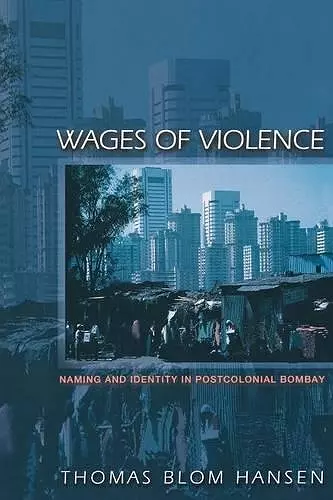Wages of Violence
Naming and Identity in Postcolonial Bombay
Format:Paperback
Publisher:Princeton University Press
Published:26th Nov '01
Currently unavailable, and unfortunately no date known when it will be back

This book is valuable and important: it contains large amounts of original data, intelligently analyzed and interpreted. Thomas Hansen probably has a better understanding of modern, plebian Mumbai and the Shiv Sena than any other scholar. And he writes vividly. -- Chris Fuller, London School of Economics This is a superb and original piece of scholarship, and its argument about the political nature of urban modernity is an important one. It is also a significant contribution to the field of anthropology, and the best account I have read on the Shiv Sena and the transformation that the Bal Thakre-led party has brought about in Bombay and Maharastra. I can think of no other work in the South Asian field that tells it with the theoretical sophistication and empirical richness that The Wages of Violence does. -- Gyan Prakash, Princeton University Readers of Hansen's The Saffron Wave and his numerous articles on Hindu fundamentalism, the Shiva Sena, and on Mumbai's Muslims, have been waiting for his 'Bombay' book for some time, with great eagerness. They will not be disappointed. The Wages of Violence is original, provocative, even innovative in its effort to analyze the changing contours of a major city as a lived social imaginary, framing the story of an unusual and disturbing political party. -- Arjun Appadurai, University of Chicago
When Bombay changed its name to Mumbai in 1995, it was the culmination of a long process that transformed India's primary symbol of modernity and cultural diversity into a site of ethnic conflict and violent nationalism. This is an account of how the city's atmosphere, dominant public languages, and power structures have changed since 1960s.When Bombay changed its name to Mumbai in 1995, it was the culmination of a long process that transformed India's primary symbol of modernity and cultural diversity into a site of intense ethnic conflict and violent nationalism. Wages of Violence is a startling account of how the city's atmosphere, dominant public languages, and power structures have changed since the 1960s. The book centers on how Shiv Sena, a militant Hindu movement, has advanced a new, "plebeian" political culture and has undermined democratic rule in India's premier city. Drawing on a large body of archival material and conversations with people from all walks of life, Thomas Blom Hansen paints a vivid picture of this dynamic and violent movement. Challenging conventional views of recent trends in Indian politics, Hansen shows that the xenophobic public culture of today's Mumbai has deep roots in the region's history and its contested identities. We are also given revealing insights into the city's Muslim communities and the authorities' understanding and control of the ethno-religious subcultures in the city. Hansen argues cogently that Shiv Sena's success represents the violent possibilities of the "vernacularization" of democracy in India. Unfolding at a juncture where the globalization of India's economy is having a deepening impact on the lives of ordinary people, this is a story that resonates with the directions urban growth is taking both elsewhere in India and beyond.
"This multilayered analysis of the meaning of Shiv Sena as both party and performer/creator of Marathi/Hindu identities combines ethnography, political science, philosophy, and Lacanian observations within a complex exploration of sociopolitical changes in Bombay (Mumbai) since the 19th century... A provocative text for those interested in the many dimensions of urban politics, even beyond South Asia."--Choice
ISBN: 9780691088402
Dimensions: unknown
Weight: 425g
280 pages